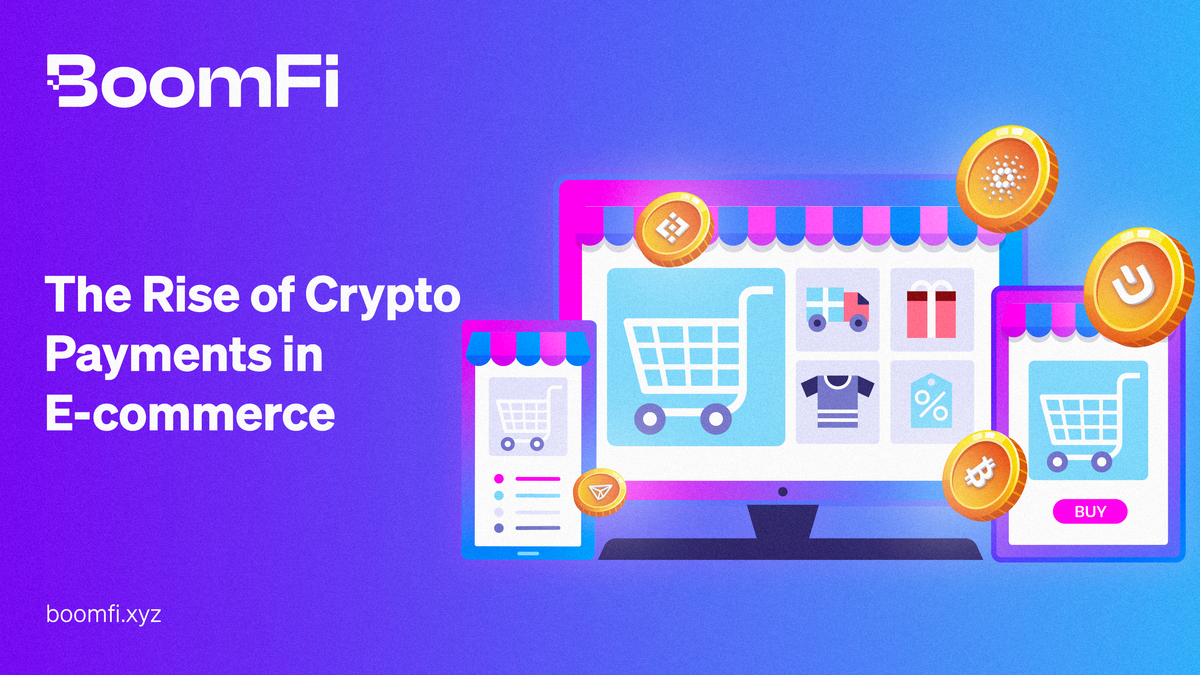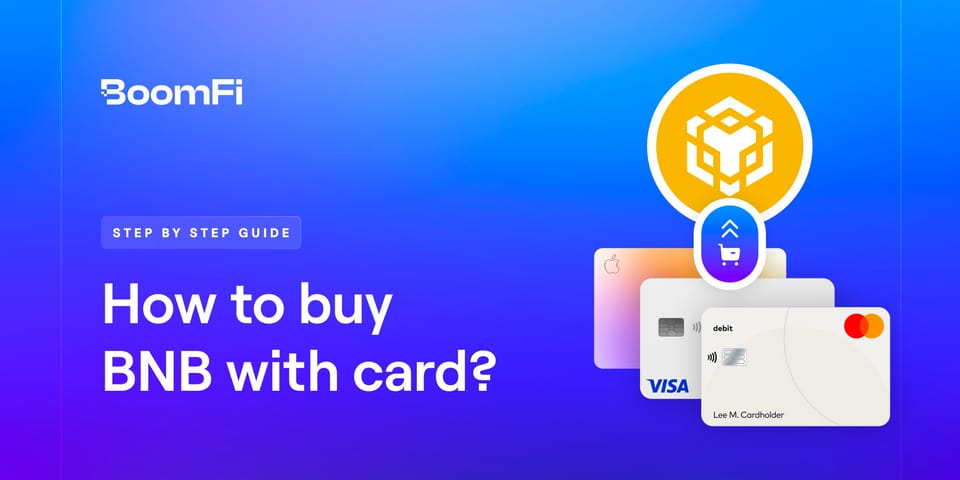The Rise of Crypto Payments in E-commerce: A Game-Changer for Businesses
Discover how crypto payments in e-commerce are revolutionizing online businesses.

Introduction: A New Era of Cryptocurrency
The advent of cryptocurrency, beginning with Bitcoin in 2009, has marked a transformative shift in the financial landscape. These digital currencies, rooted in decentralized blockchain technology, challenge traditional financial norms, offering enhanced security and transparency. Cryptocurrencies, free from central authority control, represent a significant departure from traditional fiat currencies.
Cryptocurrency's Growing Role in E-commerce
Cryptocurrencies have evolved from niche assets to viable transaction options in e-commerce, driven by their enhanced security, lower transaction fees, and faster processing speeds compared to traditional payment methods. This shift is particularly notable in online retail, where the efficiency and cost-effectiveness of cryptocurrency transactions align well with the demands of a rapidly evolving digital marketplace.
The Early Days of Cryptocurrency in E-commerce
The Advent of Bitcoin
The introduction of Bitcoin in 2009 marked a pivotal moment in the world of digital transactions. It presented a revolutionary concept: a decentralized digital currency, independent of traditional banking institutions. Bitcoin's emergence sparked a mix of curiosity and skepticism, particularly within the e-commerce sector, which was accustomed to conventional payment methods. This new form of currency, based on a complex system of cryptography and decentralized control, posed both an opportunity and a challenge for online retail.
Pioneers in Retail
Despite the initial skepticism, a few visionary businesses, predominantly in the tech sector and small online retail, quickly recognized the potential of Bitcoin and other cryptocurrencies. They were drawn to the advantages these digital currencies offered: notably lower transaction fees compared to traditional banking and the ability to reach a global market without the constraints of national currencies.
In 2014, major online retailers like Newegg and Overstock became some of the earliest adopters in the e-commerce space. Their decision to accept Bitcoin was a significant endorsement, signaling a growing interest in cryptocurrency as a viable payment option. This move was not only a bet on the future of digital currency but also a strategic move to cater to a burgeoning market of tech-savvy consumers who were early adopters of Bitcoin.
Facing the Challenges
The early days of cryptocurrency in e-commerce were not without challenges. One of the most significant hurdles was a general lack of awareness and understanding of what cryptocurrencies were and how they functioned. Many consumers and retailers were unfamiliar with the concept, leading to hesitation in adoption.
Additionally, the volatility of Bitcoin and other cryptocurrencies presented a risk. The value of Bitcoin, for example, experienced significant fluctuations, which posed a challenge for pricing products and managing revenue. This volatility was a major concern for both merchants and consumers, who could see the value of their transactions change rapidly.
Security concerns also emerged as a critical issue. The early years of cryptocurrency saw several high-profile security breaches, with the Mt. Gox incident in 2014 serving as a stark reminder of the risks involved. Approximately 850,000 Bitcoins, valued at over $450 million at the time, were stolen, shaking the confidence of many in the security of digital currency transactions.
Early challenges included a lack of awareness, Bitcoin's volatility, and security concerns, highlighted by incidents like the Mt. Gox breach in 2014. For a deeper dive, see the Deloitte and PayPal survey on cryptocurrency in retail.
Consumer Adoption and Market Growth
Rising Cryptocurrency Ownership
The landscape of cryptocurrency usage has undergone a remarkable transformation, as evidenced by its increasing adoption among consumers. According to the Pew Research Center, approximately 16% of Americans reported engaging in cryptocurrency use by 2021, a significant indicator of the growing mainstream acceptance of these digital assets. This surge in usage reflects not just an expanding awareness but also a broader confidence in the utility and stability of cryptocurrencies.
From Investment to Payment
Originally viewed primarily as investment vehicles, cryptocurrencies are increasingly being utilized as mainstream methods of payment. Their evolution is marked by a growing preference for using digital currencies for everyday online purchases and personal transfers. This shift is propelled by the ease and efficiency of cryptocurrency transactions, coupled with their enhanced security features.
Retailers' Response
In response to this shift in consumer behavior, the retail sector has shown a significant inclination towards adopting cryptocurrency as a viable payment option. Across the globe, merchants from various sectors are integrating cryptocurrency payment methods into their systems, acknowledging the benefits and potential of these digital assets in enhancing customer experience and expanding market reach.
The integration is evident across a diverse range of businesses - from small independent stores to large multinational corporations. This widespread adoption among retailers is a testament to the growing recognition of the value and practicality of cryptocurrencies in the commercial arena.
For a detailed analysis of the retail sector's adaptation to cryptocurrency, the Worldpay report offers comprehensive insights into current trends and future projections.
Advantages of Cryptocurrency in E-commerce
Efficiency and Cost-Effectiveness
One of the standout advantages of cryptocurrency in the e-commerce sphere is the efficiency and cost-effectiveness of transactions. Unlike traditional banking systems, which can involve lengthy processing times and high fees, cryptocurrency transactions are typically much faster and cheaper. This efficiency is due to the elimination of middlemen and reduced processing requirements. For instance, transaction fees for Bitcoin, despite some fluctuations, generally remain below 1%, a stark contrast to credit card fees which can range up to 3% or more per transaction. This makes cryptocurrencies an attractive option for both consumers seeking to reduce transaction costs and merchants looking to improve their profit margins.
Enhanced Security
Blockchain technology, the backbone of cryptocurrencies, offers unparalleled security, addressing the growing concerns of online transaction fraud and data breaches. Each transaction is recorded on a blockchain, creating an immutable ledger that is nearly impossible to alter. This level of security is crucial in an era where digital transaction fraud is on the rise. In 2020 alone, the reported losses from digital payment fraud amounted to billions of dollars globally. The inherent security features of blockchain technology provide a robust defense against such fraudulent activities, making cryptocurrency transactions inherently more secure than traditional online payment methods.
Global Accessibility
Cryptocurrencies excel in facilitating international transactions, offering e-commerce platforms the ability to effortlessly cater to a global audience. Unlike fiat currencies, cryptocurrencies are not bound by country-specific regulations or exchange rates, making them ideal for cross-border transactions. This global accessibility not only simplifies the buying process for customers but also opens up new markets for merchants. In 2021, cross-border e-commerce sales were estimated to reach around $736 billion, a figure that is expected to grow with the increasing adoption of cryptocurrencies in international trade.
Innovative Customer Engagement
In the realm of customer engagement, businesses are finding innovative ways to leverage cryptocurrencies, particularly through loyalty programs. By using crypto tokens, companies can offer more tangible and flexible rewards to their customers. These programs, often powered by smart contract technology, automate reward distribution, ensuring transparency and efficiency. This approach not only enhances customer loyalty but also introduces consumers to the world of digital currencies, potentially increasing their engagement with the brand.
In 2019, a report by KPMG found that blockchain-based loyalty programs have the potential to redefine customer engagement strategies, offering more personalized and meaningful rewards. The use of crypto tokens in these programs is a step towards realizing this potential, providing a unique and modern way for businesses to connect with and reward their customers.
How do crypto payments compare to other forms of payment in ecommerce?
In the ever-evolving landscape of e-commerce, businesses continuously seek innovative ways to streamline payment processes and enhance customer satisfaction. One such method that has gained significant traction in recent years is cryptocurrencies, which offer a new and unique approach to online payments. In this blog post, we will delve into the comparison between crypto payments and other forms of payment in ecommerce, examining their advantages, challenges, and potential impacts on businesses.
Firstly, one of the key advantages of crypto payments is the enhanced security they offer. Unlike traditional payment methods, which rely on sensitive customer information such as credit card details or bank account numbers, cryptocurrencies utilize advanced encryption techniques to secure transactions. This reduces the risk of fraud and identity theft, providing peace of mind to both businesses and customers.
Moreover, crypto payments provide a faster and more efficient alternative to traditional payment systems. With conventional methods, transactions often involve intermediaries such as banks, which can lead to delays and additional costs. In contrast, crypto payments operate on decentralized networks, allowing for near-instantaneous transactions that bypass intermediaries. This speed and efficiency can greatly benefit businesses, particularly those operating in international markets, by eliminating the complexities associated with cross-border payments.
Additionally, the adoption of crypto payments can broaden the customer base for businesses. Cryptocurrencies appeal to tech-savvy individuals and early adopters who value privacy and decentralization. By accepting crypto payments, businesses can attract these consumers who may be more inclined to make purchases knowing that their financial information remains private and secure.
Overcoming Challenges
What challenges do merchants face in accepting crypto payments?
Cryptocurrencies have gained significant attention in recent years as a new form digital currency. With their increasing popularity, many businesses are considering accepting crypto payments. However, merchants also face several challenges when it comes to integrating this new payment method into their operations.
One of the main challenges is the volatility of cryptocurrencies. Unlike traditional currencies, cryptocurrencies can experience significant price fluctuations within short periods. This poses a risk for merchants as they may receive a payment in crypto that loses value before they can convert it into fiat currency. To mitigate this risk, merchants need to have systems in place to quickly convert crypto payments into their preferred currency to avoid potential losses.
Another challenge is the lack of widespread adoption and understanding of cryptocurrencies. While more people are becoming familiar with cryptocurrencies, there is still a significant portion of the population that does not fully understand how they work. This can create barriers for merchants as they may need to educate their customers or provide additional support when it comes to using crypto for payments.
Additionally, the transaction speed and scalability of cryptocurrencies are also challenges for merchants. Bitcoin, one of the most popular cryptocurrencies, has been known to have slow transaction times, which may not be ideal for businesses that require fast and efficient payment processing. Moreover, as the number of transactions increases, cryptocurrencies can face scalability issues, leading to delays and higher transaction fees.
Security concerns are also a significant challenge for merchants accepting crypto payments. While cryptocurrencies are generally considered secure due to their underlying blockchain technology, there have been instances of hacks
Addressing Volatility
Businesses are increasingly turning to stablecoins and real-time conversion services to mitigate the risks associated with cryptocurrency volatility. Stablecoins, linked to more stable assets like the US dollar, provide the benefits of cryptocurrencies with reduced price fluctuations. Real-time conversion services ensure transaction values remain stable, safeguarding both businesses and consumers from the unpredictability of cryptocurrency markets.
Crypto Literacy and Regulation
Enhancing crypto literacy is crucial for broader adoption in e-commerce. Educational initiatives are underway, aimed at demystifying cryptocurrencies for both merchants and consumers. Simultaneously, adapting to evolving regulatory frameworks is essential. As regulations around cryptocurrencies become more defined, they are expected to foster a more secure and trustworthy environment for their use in e-commerce.
Are crypto payments secure for ecommerce transactions?
Crypto payments can indeed provide a secure method for e-commerce transactions. With the increasing popularity of cryptocurrencies like Bitcoin and Ethereum, many businesses are exploring the option of accepting these digital currencies as a form of payment. However, it is important to understand the security aspects associated with crypto payments.
One of the key features that make crypto payments secure is the use of blockchain technology. Blockchain is a decentralized ledger that records and verifies all transactions made with cryptocurrencies. This means that every transaction is transparent and cannot be altered or tampered with. The decentralized nature of blockchain ensures that there is no single point of failure, making it extremely difficult for hackers to manipulate the system.
Moreover, crypto payments eliminate the need for sensitive customer information, such as credit card details, to be shared with e-commerce platforms. Traditional payment methods often require customers to provide their personal and financial information, which can be susceptible to data breaches and identity theft. With crypto payments, customers can make transactions using their digital wallets, which only require a public key to complete the payment. This significantly reduces the risk of personal information being compromised.
Additionally, crypto payments offer enhanced security measures such as encryption and two-factor authentication. Encryption ensures that the transaction details are protected, making it virtually impossible for unauthorized individuals to access the payment information. Two-factor authentication adds an extra layer of security by requiring users to verify their identity using a second factor, such as a unique code sent to their mobile device.
While crypto payments do provide a high level of security, it is important for businesses
The Future of Cryptocurrency in E-commerce
Trends and Integration
The future of e-commerce is poised to witness a surge in the integration of stablecoins, and a broader adoption of cryptocurrencies by major e-commerce platforms like Shopify and WooCommerce. Such integration signifies a shift towards more mainstream acceptance and utilization of cryptocurrencies in the digital marketplace.
Predictions and Global Impact
There is a growing prediction that cryptocurrency adoption will standardize it as a mainstream payment method. With over 420 million crypto users worldwide and an average global crypto ownership rate of 4.2% in 2023, combined with a staggering 800% growth in crypto adoption in the past year, cryptocurrencies are set to have a significant impact on global e-commerce practices. In fact, 75% of retailers plan to start accepting cryptocurrencies over the next two years, and there are already over 15,000 businesses worldwide that accept Bitcoin or offer Bitcoin ATMs. These statistics underscore the expanding role of cryptocurrencies in the global business landscape, paving the way for a more interconnected and efficient global e-commerce ecosystem.
BoomFi: Pioneering Cryptocurrency Integration in E-Commerce with Advanced Product Offerings
In an era where cryptocurrency's role in e-commerce is burgeoning, BoomFi emerges as a crucial ally for businesses. It's not just about adapting to the digital currency wave; it's about leveraging it to enhance business operations. BoomFi's suite of products is meticulously designed to cater to the diverse needs of the e-commerce landscape, empowering businesses to fully embrace the potential of cryptocurrencies.
BoomFi's Comprehensive Product Suite
- Pay In Solutions
- Versatile Payment Options: Offering Paylinks, Checkout, and API/SDK integrations for diverse business needs.
- Extensive Currency Support: Accept over 100 currencies and stablecoins across various blockchains, facilitating global transactions.
- Recurring Crypto Payments: Enable monthly recurring payments, a feature crucial for subscription-based services, ensuring seamless revenue streams.
- Gas-less Transactions: Enhance customer experience by allowing payments without the need for blockchain gas tokens, simplifying the transaction process.
- Card Payment Integration: Upcoming feature set to launch in Q1 2024, broadening payment options for customers.
- Fiat <> Crypto Exchange
- Regulatory Compliance: Operate with confidence using our licensed European VASP, ensuring compliance and security.
- Efficient Currency Conversion: Facilitate smooth currency exchanges with business-friendly bank on/off-ramping using Virtual IBANs.
- Supported Currencies: Trade in major currencies like USD, EURO, GBP with real FX rates and no hidden fees.
- Global Payment Reach: Utilize SEPA, FPS, ACH, and SWIFT for comprehensive global transaction capabilities.
- Card On-ramp: A feature scheduled for Q1 2024 to further streamline the currency exchange process.
- Pay Out
- Bulk Crypto Payouts: Manage payouts efficiently in major cryptocurrencies across significant blockchains.
- Flexible Transaction Management: Utilize manual or CSV uploads for unlimited batch processing, optimizing operational efficiency.
- Real-Time Payment Settlement: Anticipated to launch in Q2 2024, this feature will further enhance the payout process.
Why BoomFi's Product Offerings Are Essential for E-Commerce Businesses
- Catering to Diverse Business Needs: Whether it's a small startup or a large corporation, BoomFi's product range is designed to meet the varied demands of different business models in the e-commerce domain.
- Enhancing Global Operations: The ability to handle multiple currencies and execute global transactions effortlessly positions businesses to expand their reach and tap into new markets.
- Streamlining Financial Transactions: With tools like gas-less transactions and upcoming card integrations, BoomFi simplifies the financial process, making it more efficient and user-friendly.
- Future-Proofing Businesses: As the digital currency landscape evolves, BoomFi’s commitment to integrating new features ensures that businesses remain at the cutting edge of technological advancements.
Conclusion: Embracing BoomFi for a Thriving E-Commerce Future
In summary, BoomFi is not just a tool; it's a comprehensive solution that empowers e-commerce businesses to navigate the complexities of cryptocurrency transactions efficiently. By adopting BoomFi's innovative product offerings, businesses can enhance their operational efficiency, expand their market reach, and stay ahead in the competitive world of digital commerce.
To explore how BoomFi can transform your business’s approach to cryptocurrency transactions, visit BoomFi's website. Stay engaged and informed about the latest in digital currency integration by following BoomFi on LinkedIn, Twitter, and Telegram. Join us in leading the charge towards a more connected and efficient e-commerce world.

 Blog/The Rise of Crypto Payments in E-commerce: A Game-Changer for Businesses
Blog/The Rise of Crypto Payments in E-commerce: A Game-Changer for Businesses





